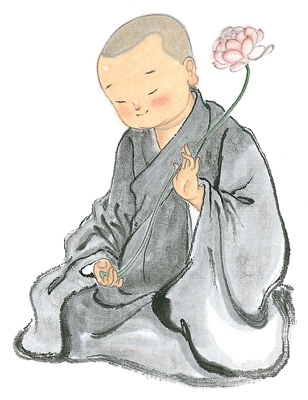Many people also mix up the two. Among them, there are non- Buddhists and some lay practitioners of Buddhism. Although increasingly more people are becoming interested in learning Buddhism, some of them seek only the benefit of the celestial beings or the human realm in this life. What will happen in the next life or the question of liberation from samsara are not at all their concerns. They burn incense and read sutras only to get a better treatment from this life. On the surface, it may appear that they are practicing Buddhism, but in fact they view Dharma practice only as a way of living. To non-Buddhists, working is their way of living; for some Buddhists, the way of living means going to the temple to render worship to the Buddhas and bodhisattvas. The so-called Dharma practice does not touch upon the meaning of life whatsoever. To make clear distinction between the way of living and the meaning of life is the most basic step to entering the path of Dharma.
~Depicted from THE RIGHT VIEW - The Way of Living and the Meaning of Life











